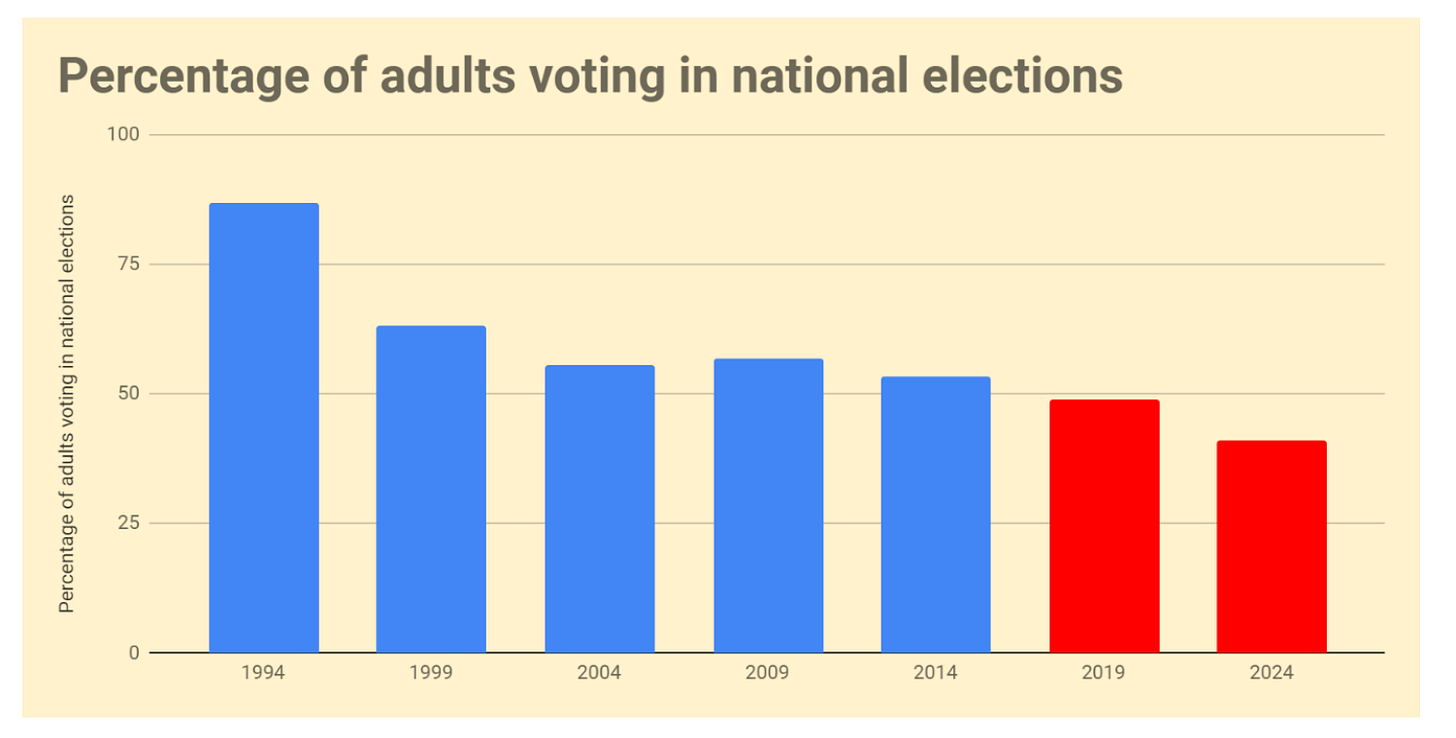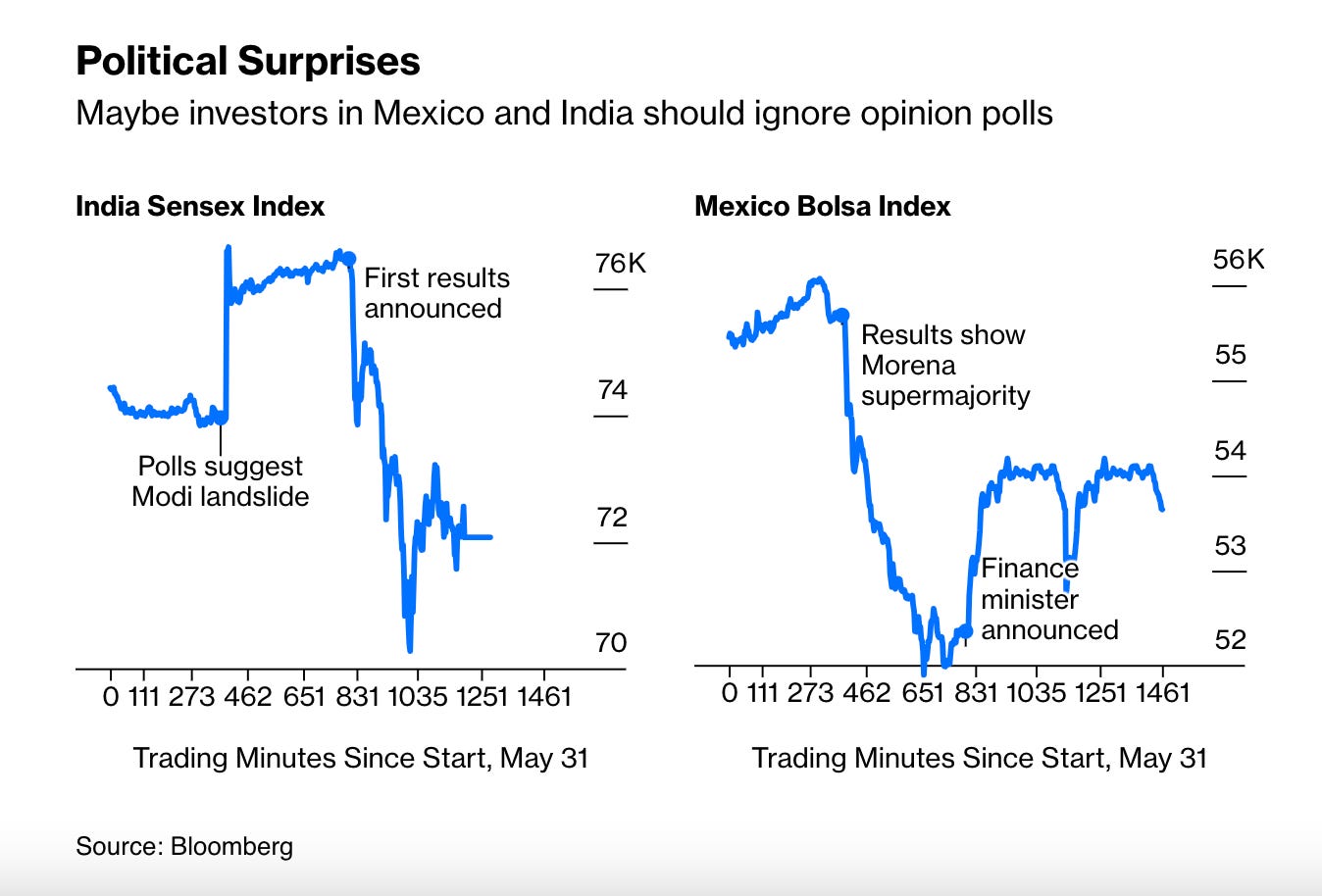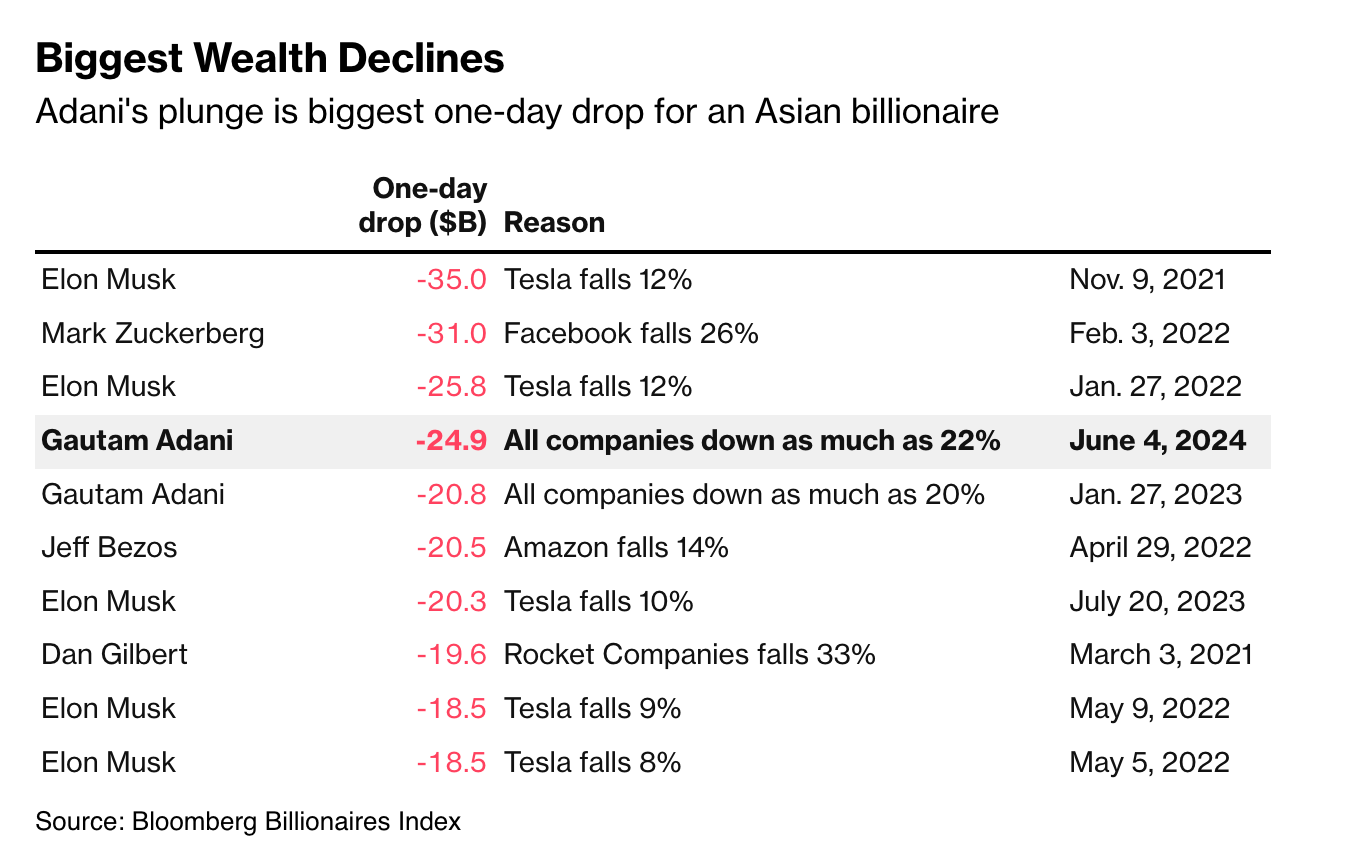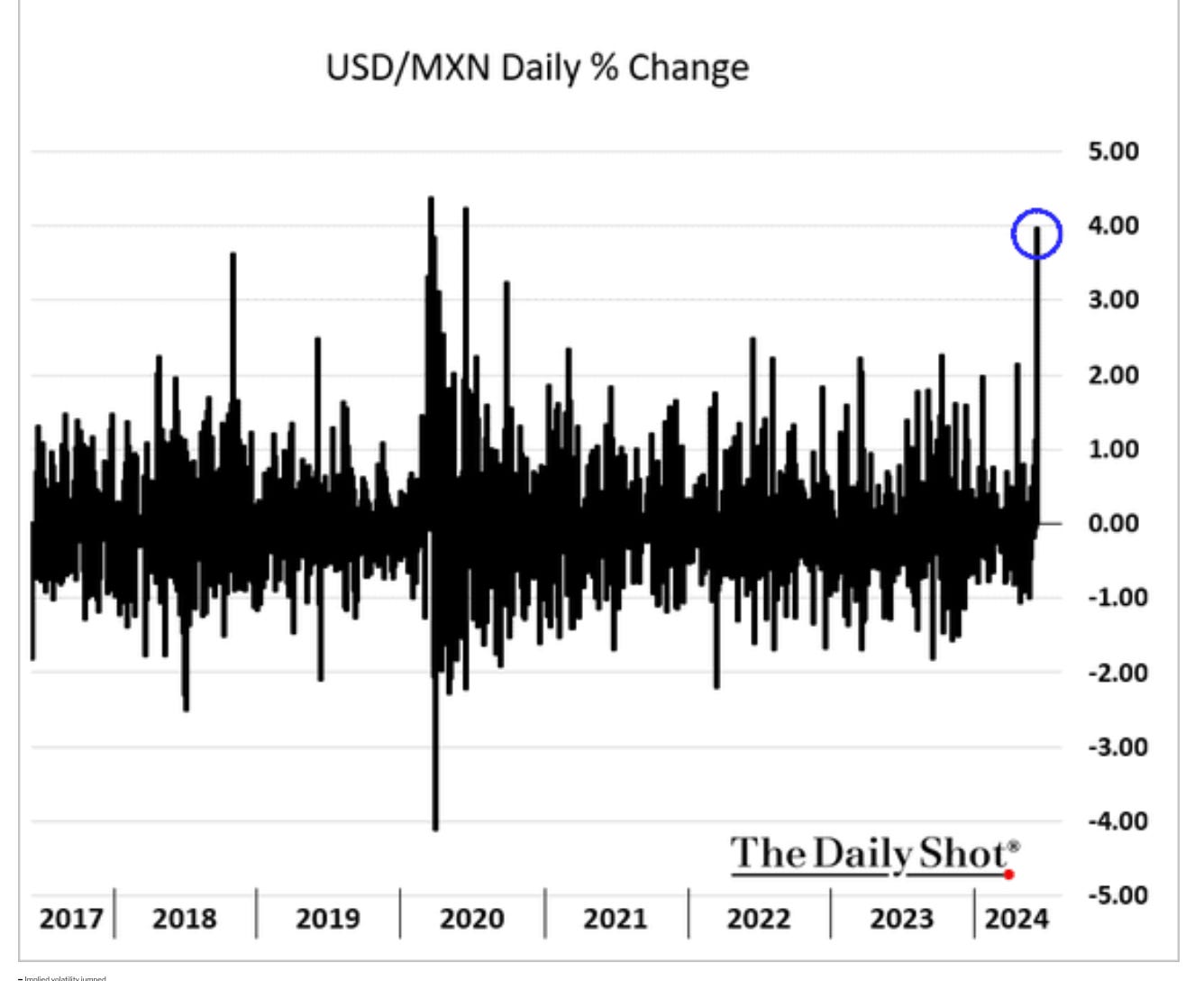Three big elections in countries that investment analysts like to call “emerging markets” - South Africa, India Mexico. Three significant outcomes. How do the markets react?
South Africa
Hard as it was to believe that the ANC would ever lose its majority in post-Apartheid South Africa, economic disappointment and governmental failure made that outcome increasingly likely.
Since 2008 S. Africa has experienced stagnation in gdp per capita (measured here in 2022 dollars).
The most damning statistic about the election is not so much the ANC slumping to 40 percent, as the lack of political engagement amongst South Africa’s population. Once we allow for low rates of voter registration (64%) and turnout of less than 59 %, barely more than 40 percent of the adult population participated in the election. Amongst younger South Africans, the principal victims of 50 percent youth unemployment rate, participation was even lower.
Source: Daily Maverick
The ANC’s pivot to a more militant foreign policy, aligned with the BRICS, did not convince the voters. By a margin of 2:1 South Africans considered a Western alignment more favorable for the economy than alignment with the BRICS or with the rest of Africa.
In the aftermath of the election, the South African rand wobbled.
But there was no panic, since investors are betting that the most likely outcome of the ANC’s defeat is a coalition with the centrist DA. As the Daily Maverick commented:
The DA received sufficient votes in the election to make it the sole partner necessary for the ANC, since combined the two parties would have 62% of the vote. But bringing in the IFP might be a good diplomatic move for the ANC as it could allay concerns about partnering with an “anti-black” party — which is the narrative being spun by the DA’s critics on social media. The IFP might also be able to play a kind of (not particularly enviable) buffering role between the DA and the ANC.
The moderate ANC-DA-IFP coalition is not a done deal:
It has been reported that ANC Chair Gwede Mantashe is opposed to an agreement with the DA, while the party’s veterans — like Snuki Zikalala and Mavuso Msimang — are said to be vocally in favour. Former Cabinet minister Lindiwe Sisulu has urged the ANC to reject the DA in favour of a “Black Pact of Progressive Forces”. Trade union federation Cosatu — an alliance partner of the ANC — said before the elections that its preferred coalition partner for the ANC would be the EFF and not the DA. On Tuesday, Cosatu reiterated its objection to the ANC entering a coalition with the DA.A ferocious campaign is being waged on social media, with the aid of Independent Media, in favour of a coalition pulling in the MK party and/or EFF rather than the DA. Cosatu’s argument before the elections was that the EFF would be more protective of the rights of the black working class than the DA, which is why the ANC should favour the Fighters. In economic terms, the DA and the ANC are not worlds apart; both take fairly centrist positions, though the ANC swings more left — particularly on issues like the National Health Insurance project, which the DA has outright rejected. But both the EFF and the MK party pursue far, far more radical economic policy positions than the ANC, particularly in terms of nationalising banks and mines. … In terms of the key pieces of legislation the ANC has introduced to Parliament in recent years, the DA has rejected the majority. Of 12 laws introduced over the past decade, ranging from the National Minimum Wage Bill to the NHI Bill, the DA voted against 10 and in support of just two. This is a stark indicator of the ideological distance that still remains between the two parties, although opposition politicking naturally also plays a role. … One of the greatest sticking points in negotiations may be the position of President Cyril Ramaphosa: the MK party has said it would not consider being part of a coalition while Ramaphosa is at the helm of the ANC, while ANC Secretary-General Fikile Mbalula told journalists on Sunday that any suggestion that Ramaphosa be ditched was a non-starter in talks. Although the DA has been vocal in its criticism of Ramaphosa over the Phala Phala saga and other issues, it is likely to find a Ramaphosa-led ANC far more palatable to partner with than an ANC led by the current Deputy President Paul Mashatile, who would be almost certain to follow Ramaphosa into the leader’s chair.
Source: Daily Maverick
The market reaction to the results in India and Mexico, which are in many ways far less transformational than the ANC’s historic defeat, were far more dramatic.
In India, according to Bloomberg, the news from the polls “drove two days of dramatic trading as the benchmark Sensex index shot for the sky after weekend exit polls indicated a landslide, then tanked in response to live results. In Mexico, Claudia Sheinbaum of the incumbent Morena party slightly exceeded expectations and also won a supermajority in the lower house of Congress. The prospect of such a result (that Modi would win a huge majority) had fired a rally in India; in Mexico, it caused a huge selloff”. Clearly it depends on political complexion of the majority and its agenda as far as taxes and investment are concerned.
In India’s political history the fact that Modi has to rule with coalition partners is not in itself unusual. The big question in the markets is what a weaker Modi will mean for the infrastructure & oligarch-led growth model that has been his trademark.
Contrary to the hype, investment in India as a whole has not surged. As a share of GDP it is down from his high of 36 percent in the 2000s.
But government spending on infrastructure has hit record highs in recent years.
No one has done better out of that boom than Gautam Adani.
For Adani the one-day impact of an underwhelming election win for Narendra Modi’s party was worse than a serious short-seller attack. The Indian tycoon’s wealth collapsed by $25 billion on Tuesday. Every part of his Adani Group sold off, wiping out almost $45 billion in market value in a one-day shock.
Adani’s wealth wipeout was the fourth-largest one-day decline in personal wealth ever recorded. Only Elon Musk and Mark Zuckerberg have suffered larger fluctuations.
Source: Bloomberg
Across the whole market, $400 billion was wiped off Indian stocks on the election news. Clearly, investors had built a bull case for India based on the expectations of a big Modi win. They liked the idea that an all-mighty Prime Minister could bulldoze the constraints on India’s economy - in logistic, in agriculture - whilst managing the fiscal constraint. They were willing to take a gamble on Hindu nationalism for that. Now all of those constraints seem a little more insuperable. Coalition politics risks putting upward pressure on spending. And with Modi’s nimbus dented the question of his successor is posed, raising the prospect that even more radical ideologues may come to the fore. How markets react is uncertain and will be determined in part by the balance between local retail investors and foreign buyers of Indian stock
Ahead of the election locals were long Indian stocks, foreigners were short.
Mexico
In Mexico by contrast with both South Africa and India, the election outcome was emphatic and so too was the reaction of the markets.
The victory for progressive climate scientist Claudia Sheinbaum, was in itself the confirmation of well-predicted trends. President Andres Manuel Lopez Obrador and his successor are both popular. The government is judged by the electorate to have done well by the majority and they were rewarded with a huge win. Investors fear the risk that this poses of deep constitutional change and this has provoked a more or less open confrontation with the political majority. The currency and the stock market both sold off.
In part the violence of the reaction has to do with the backdrop. As Bloomberg comments:
For the last two years, the world’s fund managers had a recipe to mint money in Mexico. Borrow anywhere interest rates were low, pile into Mexican assets — and clean up as the peso marched higher and higher. Virtually overnight, it’s no longer such a sure thing. The landslide victory by Claudia Sheinbaum in the presidential election on Sunday has … increased the chances that Sheinbaum could push through measures that eluded President Andres Manuel Lopez Obrador, such as changing rules on the selection of supreme court judges and eliminating independent regulators. “The days of unwavering Mexican peso appreciation are probably over,” said one CIO in New York.
As the peso suffered its most serious loss since the COVID panic of 2020, Morgan Stanley ditched its positive view on Mexican stocks … “Mexico finds itself in an unprecedented situation and we are in wait-and-see mode on key backstops,” the bank declared. … The country’s stocks plunged more than 6% on Monday, the worst session since the onset of the pandemic in early 2020 ….” Morgan Stanley is pulling back hard on exposure to names tied to Mexico’s investment cycle such as cement maker Cemex SAB de CV and industrial property-focused real estate investment trust Prologis Property Mexico SA de CV.
Scrambling to stabilize the situation, Mexico’s Finance Minister got on a call to investors to provide reassurance. As the FT reports:
Mexico’s finance minister tried to reassure investors in a hastily scheduled call on Tuesday that the leftwing government remained committed to fiscal discipline after its landslide election win. But traders continued to sell the peso on fears of radical constitutional change after voters handed a huge mandate to president-elect Claudia Sheinbaum in Sunday’s vote … Markets took fright after the result, fearing the commanding win would allow the government to advance plans that investors worry could dismantle checks on executive power and threaten the rule of law. That prompted Sheinbaum to announce that Finance Minister Rogelio Ramírez de la O, who is respected by investors, would stay on in her cabinet after President Andrés Manuel López Obrador hands over power in October. The minister spoke to investors in a two-minute call on Tuesday morning promising to cut the budget deficit next year and stick to orthodox economic policies. “Our project is based on financial discipline, abiding by [central bank] autonomy, adherence to the rule of law and facilitating national and foreign private investment,” he said, according to a recording of the call. However, Ramírez de la O took no questions and the brief call did not address the key concerns about constitutional reform. … Aaron Gifford, a sovereign credit analyst at T Rowe Price, said the call failed to allay concerns. “It seems like we’ll have to wait for more details around the transition plan, especially given fears of AMLO pushing through some reforms during the month that he overlaps with the new congress,” he said, referring to the president by his initials.
The reaction seems rather ungrateful seeing as López Obrador made fiscal austerity a hallmark of his government. He offered practically no stimulus during COVID even as hundreds of thousands of Mexicans died. But ahead of the election he launched into a spending spree that drove the deficit to 5.9 per cent of GDP this year. The Finance Ministry is promising to halve that next year. That will deliver a fiscal shock and poses stark political questions. The president elect has promised not to raise taxes immediately and to focus on collection and enforcement. But she will be hard pressed to boost welfare spending further, enhance public services and cut the deficit without new taxes. Pemex the government-backed oil firm is a can of worms. One option to raise revenue would be to squeeze profits out of the bankings sector. The markets like none of this. Nor do they like the agenda of judicial and electoral changes, large-scale pension and welfare reform, improvements to minimum wage and prohibitions on fracking and GM crops.
Three elections and the confirmation, once again, of a stark reality: democracy and capitalism can co-exist, but investor interests do not react well to left-wing governments with large majorities. They do not simply accept the will of the majority, but through the media and markets make their opposition known. Though foreign investors may have views. In the first instance, this is not a matter of global capital positioning itself against national democracy. Certainly, as far as Mexico and India are concerned it is above all “local” capital whose interests are at stake. To avoid an immediate panic and snowballing “loss of confidence”, even as they celebrate their win, the victorious democratic forces hasten to make public concessions to capital. Though this is a pragmatic concession to reality, it starkly reveals that though democratic majorities can make history, they do not do so as they please or under conditions of their own choosing, but on terms dictated by powerful vested interests.















"Though this is a pragmatic concession to reality, it starkly reveals that though democratic majorities can make history, they do not do so as they please or under conditions of their own choosing, but on terms dictated by powerful vested interests."
Hence vested interests should be guillotined 😄
Adam is an innocent man. Mexican government's have never been leftist or rightist. It depends on the situation and mainly on the maximization pf power for the rulers. The PRI governed 70 years without any
checks and the president was a absolutist monarch. Amlo grew in such media and wants to reproduce it. It ia a question pf power not of ideology. I am frankly disappointed with Adam that he uses the old model right-left in an extremely trivial way to analyze countries that frankly speaking he does not understand. Keep to Germany, USA and maybe Europe !!!